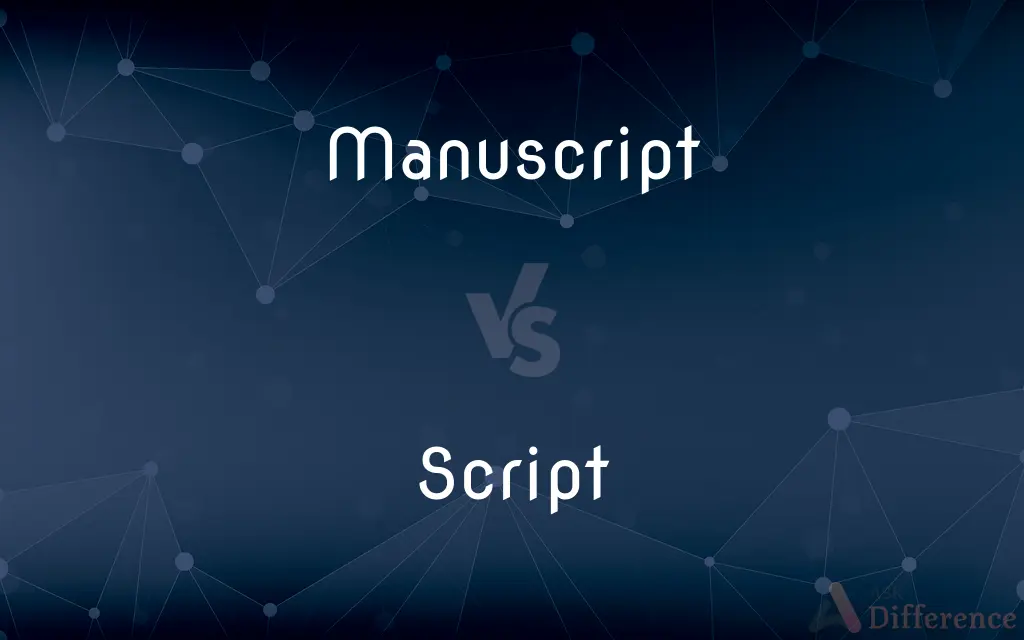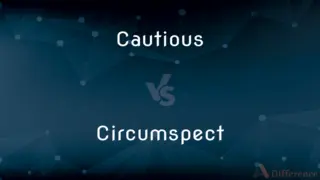Manuscript vs. Script — What's the Difference?
By Tayyaba Rehman & Fiza Rafique — Updated on March 14, 2024
A manuscript refers to a document's handwritten or typed draft before publication, often encompassing books, academic papers, or music, whereas a script is a written work intended for performance, such as for plays, films, or broadcasts.

Difference Between Manuscript and Script
Table of Contents
ADVERTISEMENT
Key Differences
Manuscripts are original drafts of written works, ranging from books to academic papers, that are often in the process of review or editing before publication. These documents can be handwritten or typed and represent the raw form of the author's ideas and research. On the other hand, scripts are specifically designed for performance, providing dialogue, stage directions, and instructions for actors, directors, and production teams. Scripts serve as the blueprint for plays, films, television shows, and other performance arts.
The purpose of a manuscript is primarily for reading, analysis, and eventual publication in some form, whether it's a novel, a scholarly article, or a piece of music. Manuscripts undergo various stages of editing and peer review before reaching their final published form. Scripts, however, are crafted with the intention of being brought to life through performance. They are essential tools in the production process of plays, movies, and television programs, guiding actors, directors, and crew members through the narrative and technical aspects of the production.
The format and structure of manuscripts can vary widely depending on their intended purpose and field. Academic manuscripts, for example, often adhere to strict formatting guidelines, while literary manuscripts might be more flexible in their presentation. Scripts follow a standardized format that includes specific elements such as character names, dialogue, stage directions, and scene descriptions. This format is crucial for the practical aspects of rehearsals and production, ensuring clear communication among all members of a performance project.
While both manuscripts and scripts are forms of written work, their purposes, audiences, and formats differ significantly, reflecting their distinct roles in the worlds of literature, academia, and the performing arts.
Comparison Chart
Definition
A document's draft, either handwritten or typed, intended for reading and publication.
A written work designed for performance, containing dialogue and directions.
ADVERTISEMENT
Purpose
For reading, analysis, and publication in various forms such as books or academic papers.
To guide performance in plays, films, and broadcasts with dialogue and stage instructions.
Format
Varies widely, may follow specific guidelines in academic or literary fields.
Standardized, including character names, dialogue, stage directions, and scene descriptions.
Audience
Targeted towards readers, reviewers, or publishers for eventual publication.
Intended for actors, directors, and production teams in the performing arts.
Example Use
Novels, scholarly articles, music compositions.
Theater plays, movie scripts, television show scripts.
Compare with Definitions
Manuscript
A draft of written work, often in preparation for publication.
The author submitted the final manuscript to the publisher.
Script
A written blueprint for performances, containing dialogue and instructions.
The director praised the script for its compelling narrative.
Manuscript
Used in academic and literary contexts, among others.
The researcher's manuscript was accepted for journal publication.
Script
Follows a specific format for ease of use during production.
The script's clear stage directions facilitated smooth rehearsals.
Manuscript
Undergoes revisions and peer review before publishing.
The manuscript received positive feedback during the review process.
Script
Essential for plays, films, and television productions.
The new film's script attracted top actors with its strong characters.
Manuscript
Can be handwritten or typed, containing original content.
The ancient manuscript was carefully preserved in the library.
Script
Guides actors, directors, and crew through the performance.
The script included detailed notes for the cinematographer.
Manuscript
Represents the raw form of the author's ideas and work.
The composer's original manuscript revealed the evolution of the symphony.
Script
Can vary from detailed narratives to loose outlines for improvisation.
The comedy show's script allowed for spontaneous improvisation by the cast.
Manuscript
A manuscript (abbreviated MS for singular and MSS for plural) was, traditionally, any document written by hand – or, once practical typewriters became available, typewritten – as opposed to mechanically printed or reproduced in some indirect or automated way. More recently, the term has come to be understood to further include any written, typed, or word-processed copy of an author's work, as distinguished from its rendition as a printed version of the same.
Script
Handwriting.
Manuscript
A book, document, or piece of music written by hand rather than typed or printed
Early Gothic manuscripts
An illuminated manuscript
Script
A style of writing with cursive characters.
Manuscript
A handwritten book, poem, or other document, or a collection of such handwritten documents bound together
The contents of the manuscript include a romance and a saint's life.
Script
A particular system of writing
Cuneiform script.
Manuscript
A version of a book, article, or other work before being published or prepared for publication
The author submitted the manuscript as a text file.
Script
A style of type that imitates handwriting.
Manuscript
Handwriting, especially in contrast to print
Her last poems were left in manuscript.
Script
The matter set in this type.
Manuscript
Handwritten, or by extension manually typewritten, as opposed to being mechanically reproduced.
Script
The text of a play, broadcast, or movie.
Manuscript
A book, composition or any other document, written by hand (or manually typewritten), not mechanically reproduced.
Script
A copy of a text used by a director or performer.
Manuscript
A single, original copy of a book, article, composition etc, written by hand or even printed, submitted as original for (copy-editing and) reproductive publication.
Script
(Law) The original of a legal instrument, as opposed to a copy.
Manuscript
Written with or by the hand; not printed; as, a manuscript volume.
Script
(Computers) A simple program in a language that the computer must convert to machine language each time the program is run.
Manuscript
An original literary or musical composition written by the author, formerly with the hand, now usually by typewriter or word processor. It is contrasted with a printed copy.
Script
To prepare (a text) for filming or broadcasting.
Manuscript
Writing, as opposed to print; as, the book exists only in manuscript.
Script
To arrange, direct, or control (an event or a person) as if supplying a script
"the brilliant, charming, judicial moderate scripted by his White House fans" (Ellen Goodman).
Manuscript
The form of a literary work submitted for publication
Script
(Computers) To write (code) for a program.
Manuscript
Handwritten book or document
Script
A writing; a written document.
Script
Written characters; style of writing.
Script
(typography) Type made in imitation of handwriting.
Script
An original instrument or document.
Script
(countable) The written document containing the dialogue and action for a drama; the text of a stage play, movie, or other performance. Especially, the final form used for the performance itself.
Script
(computing) A file containing a list of user commands, allowing them to be invoked once to execute in sequence.
Script
(psychology) A behavioral script; sequence of actions in a given situation.
Script
(linguistics) A system of writing adapted to a particular language or set of languages.
Script
(informal) prescription for drugs or medicine
Script
(transitive) To make or write a script.
Script
(transitive) To devise, concoct, or contrive.
Script
A writing; a written document.
Script
Type made in imitation of handwriting.
Script
An original instrument or document.
Script
Written characters; style of writing.
Script
A written version of a play or other dramatic composition; used in preparing for a performance
Script
Something written by hand;
She recognized his handwriting
His hand was illegible
Script
A particular orthography or writing system
Script
Write a script for;
The playwright scripted the movie
Common Curiosities
What is the purpose of a script?
The purpose of a script is to guide performances in plays, films, and television, providing dialogue, character interactions, and technical instructions for the production.
Are scripts used outside of theater?
Yes, scripts are used in a variety of performance arts, including movies, television shows, and even in broadcasting.
How does a script differ from a manuscript?
A script is specifically written for performance, containing dialogue and stage directions, while a manuscript is a draft of a written work intended for reading and publication.
How important is the format of a script?
The format of a script is crucial as it includes specific elements like character names, dialogue, and stage directions that are essential for rehearsals and production.
Can a manuscript be a music composition?
Yes, the term manuscript can also refer to the original draft of a music composition, in addition to literary and academic works.
What audiences are manuscripts and scripts intended for?
Manuscripts are targeted towards readers, reviewers, or publishers for eventual publication, whereas scripts are intended for actors, directors, and production teams in the performing arts.
Are all manuscripts intended for publication?
While most manuscripts aim for publication, some may serve other purposes, such as personal projects, academic submissions, or archival records.
How does a script influence a performance?
A script serves as the backbone of a performance, guiding actors through their roles, informing directors of scene transitions, and providing crew members with technical instructions.
Can manuscripts be handwritten?
Yes, manuscripts can be either handwritten or typed and represent the author's original ideas and work.
Do manuscripts undergo editing?
Manuscripts typically undergo several stages of editing and revisions, often involving peer review, before reaching their final published form.
What is a manuscript?
A manuscript is an original draft of a written work, such as a book, academic paper, or music composition, often intended for publication.
Can the format of a manuscript vary?
Yes, the format and structure of manuscripts can vary widely, especially between different fields like literature and academia, each with its own set of guidelines.
Is the scriptwriting process different for films and theater?
While the fundamentals of scriptwriting remain similar, scripts for films and theater may differ in terms of narrative structure, detail level, and technical directions due to the different nature of these mediums.
Do scripts always follow a strict narrative?
Scripts can vary from detailed narratives to looser outlines that allow for improvisation, depending on the nature of the performance and the director's approach.
How do manuscripts contribute to academic research?
Manuscripts in academia, such as research papers or scholarly articles, contribute to the body of knowledge in a field, often undergoing peer review to validate findings and arguments before publication.
Share Your Discovery

Previous Comparison
Waterspout vs. Tornado
Next Comparison
Cautious vs. CircumspectAuthor Spotlight
Written by
Tayyaba RehmanTayyaba Rehman is a distinguished writer, currently serving as a primary contributor to askdifference.com. As a researcher in semantics and etymology, Tayyaba's passion for the complexity of languages and their distinctions has found a perfect home on the platform. Tayyaba delves into the intricacies of language, distinguishing between commonly confused words and phrases, thereby providing clarity for readers worldwide.
Co-written by
Fiza RafiqueFiza Rafique is a skilled content writer at AskDifference.com, where she meticulously refines and enhances written pieces. Drawing from her vast editorial expertise, Fiza ensures clarity, accuracy, and precision in every article. Passionate about language, she continually seeks to elevate the quality of content for readers worldwide.















































